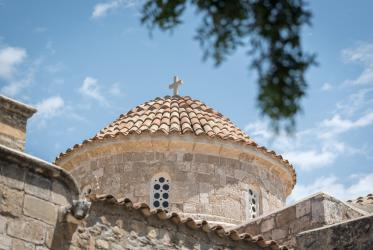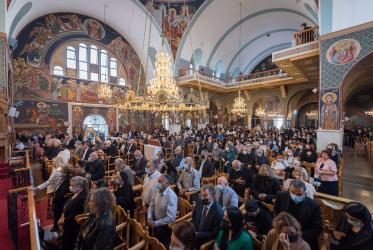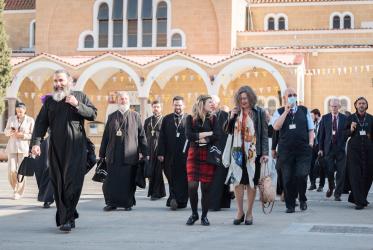by Gabriel Habib
in Report of sub-committee II
Special Commission on Orthodox participation in the WCC
(Vilemov, Czech Republic, August, 2000)
[See responses to this paper below]
In order to help the Orthodox and Protestant Church representatives to the WCC have an enriching and constructive dialogue towards Christian Unity, it is appropriate to point out certain concerns related to the significance and nature of the WCC as well as the style and ethos determined by their present dialogue.
1. The WCC organization
In relation to the WCC organization, it is appropriate to mention the following concerns:
a. After the decline, in many parts of the world, of secular ideologies like communism, socialism and modern nationalism, many people have been re-identifying themselves in religious terms. This has led to the fragmentation of some societies into "ethno-religious" groupings and to some kind of "religious fundamentalism", even within some Orthodox and Protestant Churches. It made these Churches highlight their theological and cultural "particularities" over and against international or inter-Church "commonalties", thus reducing, if not withdrawing, their spiritual and material support to the ecumenical movement and its related organizations. At the same time, many other religions are reviving their faith in God and trying to replace Christianity, which failed, through its "disunity", to manifest His Oneness, through its "unity" in history.
Therefore, the issue is that the Churches are called to renew their hope in the ecumenical movement, through the WCC. Consequently, they could witness together, within the Council, to the oneness of their Triune God by searching for their Oneness in history. Such a witness is fulfilled on the basis of their theology of incarnation and of the Biblical calling to be one as He and His Father are one.
b. There is a perception among Orthodox believers that the "western" cultural reality of self-secularized Christianity has transformed the WCC, as an "ecclesiological fellowship", into a super-church "Institution" that tends to impose its decisions on its member Churches and to carry out a form of "bureaucratic" relationship with them. It is believed that it also led the Protestants to become "relativist" and "denominationalist".
Therefore, the issue is that the WCC should always try to be an expression of the ecclesiological and cultural "diversity" of the member Churches. Such an expression should be formulated in light of the opinions and attitudes of the local Churches with whom the WCC should maintain "personal" relationships.
2. The Orthodox-Protestant dialogue within the WCC
In connection with the ethos of the Orthodox-Protestant encounter within the WCC, one could express the following concerns:
a. Despite its positive and constructive achievements, the ecumenical dialogue within the WCC framework is going through a period of deep frustration due to "proselytism" among the Orthodox and to the increasing psychological "confrontation" between Orthodox and Protestant groups of Churches, which are mainly concerned about their own positions or particular ecclesiology. For instance, in approaching theological or ethical questions, an easy categorization of the Orthodox as "conservative" and the Protestants as "liberal" is increasingly prevailing.
Therefore, the issue is to help the Orthodox and Protestants, in the WCC, cease to consider each other as "monolithic" groups and to liberate their dialogue, from all the ongoing misconceptions, in order to revive it as a genuine search for the Divine Truth. This will make them recognize the diversity of the WCC constituency, have the courage to avoid compromise, undertake self-criticism as well as promote mutual challenges with love and mutual respect.
While they practice inter-communion, the Protestant Churches refuse to be considered as One Church or one confessional family of Churches. This fact and the Protestant diversity of theological positions even within single "communions" is confusing the Orthodox, running counter to their understanding of the relationship between personal or individual convictions, which are sometimes expressed in WCC meetings and the Church theology. At the same time, Protestants may wonder whether the apparent Orthodox "unity", is not tending towards an unhealthy "uniformity". Consequently, the nature of the fellowship experienced within the WCC is an "ecclesiological challenge" that makes "Koinonia" more a goal than a reality.
Therefore, the issue is to try to discern what kind of "unity" is sought? How is the Church "local" and, at the same time "Universal"? What does it mean to belong to a Council of Churches? And what is the implication of a common baptism?
c. There is an Orthodox criticism that the Protestant Churches do not take "Tradition" seriously. In this respect, the Orthodox suspect that the Protestant Churches believe themselves to be the "new" and the "future", while they consider the Orthodox Churches to be the "old", since their spirituality is still determined by the Seven Ecumenical Councils and their liturgy is that of St. John Chrysostomos.
Therefore one of the objects of Orthodox-Protestant dialogue within the WCC should be for the Protestants to better appreciate the significance of Orthodox "Tradition" and for the Orthodox to understand the Protestant concept of "history", thus leading them to recognize the existence of different hermeneutical principles and world views. In this respect, it is important to remember that the "old", the "present" and the "future" are one, since the Church, as the mystical body of Christ, is according to St. Paul, "the same yesterday, today and for ever" and is the "Alpha and Omega" of history.
There is a feeling that, while the Orthodox emphasize that the Church, as the mystical body of Christ, is "transcendental", the Protestants stress the fact that the Church is "historical". This is leading sometimes, within the WCC, to the false understanding that the Orthodox believers are "isolating" themselves in the "supra-historical" realm and the Protestants are "activist".
Therefore, the people involved in the Orthodox-Protestant dialogue, within the WCC, should be helped to always remember that the Church is the perfect balance between the transcendental or the "divine" and the "historical" or the "human". Accordingly, this balance determines her style of life and witness.
3. Practical arrangements
In order to create a new climate or ethos of our life together in the WCC, we should essentially depend on the action of the Holy Spirit. At the same time and as human beings, we should participate by undertaking, at least, the following ecumenical actions:
Ask the moderator of the WCC central committee and the moderators of the Special Commission to address the members of the WCC Executive Committee, Central Committee and General Assembly, in order to appeal to them to liberate themselves from the stereotypes that they seem to have about each other. This might enable them to deal with the issues involved with love and mutual respect of their particular ecclesiology and Tradition.
Secure reports to the Executive and Central Committees as well as to the General Assembly on the findings of the bilateral Church dialogues with the view of discerning their practical impacts on the WCC multilateral dialogue towards unity.
Organize, during the major WCC events, "Padares" or platforms of free discussions with the aim of creating an appropriate ethos for a constructive dialogue.
Devote a special session of the Executive and Central Committees as well as the General Assembly that would aim at creating the appropriate ethos and at crystallizing a common agenda in light of the ecclesiological diversity and the different historical attitudes.
Promote ecumenical exposures and training for the younger Orthodox and Protestant generation. This could be done through the WCC Ecumenical Institute or the existing Regional Training Centers preferably for an equal number of Orthodox and Protestant participants.
Response to the paper of Gabriel Habib
by Rev. Yadessa Daba
First of all I would like to thank Mr. Gabriel Habib for bringing to our attention through this paper some of the concerns and problems that might have hindered a good relationship between the protestant and the orthodox families of the WCC members. I would like to respond to three points in his paper.
A. It is true that religious fundamentalism and ethnicity have been revived after the fall of communism, socialism and modern nationalism. Before the collapse of communism many Churches and Christians were struggling together in solidarity against communism and its atheistic teachings. They thought that communism was the common enemy.
But after communist ideology was removed many groups organised themselves into religious fundamentalist and ethnic groups. Some even have gone back to their traditional religions. But we could not stand together with one another to speak against this kind of influence because we ourselves are divided. But we have to come out of our shells and speak or give directions to some of this religions that sometimes dehumanize people.
B. The perception of the orthodox churches to see the WCC becoming a super-church is not acceptable to me. Because we did not feel that the WCC has put a pressure on us to accept things that we did not want to accept.
On the other hand WCC has served as an advocate for the churches in the third world countries when they suffered under dictatorial and unjust regimes. For example it has contributed towards freeing the people in Southern Africa from the apartheid oppressive systems. Therefore we never felt that WCC is trying to be seen as a super-church. We are rather proud to be members of the WCC.
With regard to proselytism, this has been widely discussed and talked about. I think there are at least two ways of avoiding proselytism. One is to give attention through proper teaching and spiritual nurture. We need to protect and guide our members from running away. The second thing is to recognise, respect and accept each other as churches of God. Unless we recognize and respect each other it is very difficult to stop proselytism.
C. I agree that we have to respect orthodox tradition. There are several important points in tradition. But many times we do not know enough to respect them. We do not understand them because we do not know the language in which they were written. Therefore, our orthodox brothers have to help us translate them into the language people can understand. These traditions should not be static or always remain the same at the same place. They should be translated and interpreted into languages that others can understand. Our orthodox friends should not remain standing in one place and expect every one to go and meet them there. They should make a move so that we may both meet on the way as we both move to each other. They should not stand aloof and blame WCC. But they should feel as part of it and make self-criticism or re-evaluation from within.
I agree with practical suggestions; particularly I support the idea of padare not to introduce other issues, but to make a place where the churches learn about each other. I thank you again and I hope that this good discussions will continue so that we learn more about each other.
My thanks again to Mr. Gabriel Habib and to the chairperson.
Response to the paper of Mr Gabriel Habib
by Bishop Hans Gerny
First I would like to thank Dr. Habib for his clear and open statement. I appreciate highly that -- like in the whole meeting here -- problems are put on the table and not wiped under the carpet.
Before coming to my points, I would like to stress, that I cannot speak for the Protestants. I can only speak as Oldcatholic, living fully in the western catholic tradition.
There is a perception, that the "western" cultural reality of self-secularized Christianity has transformed the "WCC"...
I agree that in the last fifty years the Western Churches changed enormously. But this change has its roots not only in the last fifty years, but in much older developments -- developments which the Eastern Churches never had:
In the Middle Ages in the western theology Aristoteles begun to play a most important role: This altered the christian thinking more than we perhaps realize.
Renaissance and Humanism -- let's say between 1400 and 1600 -- caused the fact that in the western culture the Christian God ceased to be the center: instead of God the human being became more and more the center of reflection.
Reformation and Age of Enlightment changed the theology again. Individualistic philosophy, the Human Rights and the axiom of the equality of all human beings produced a new theological thinking.
Another fact is that the relation between the Emperor and the Church went different ways in West and East. In the West the Empire lost 1077 its fight against the Pope. In the East Emperor and Church lived in a kind of symbiosis. So the Western Church never was the "imperial"church as in the East. The importance of this fact is also proved by the different way of the Oriental Churches.
A few years ago I was in Athens with a greek archaologist and art historian. She showed us the Acropolis. The greek way up to the hill is only a path (and not a street) following the natural structure of the rock, going up smoothly -- so to say kat'oikonomian. The roman access to the Acropolis is very different in its character. There are clear, geometrical, artificial steps in marble -- constructed on a clear plan. Look, the archaologist said, here you can see the difference between eastern and western thinking (Perhaps lies here a reason for the western tendency to organize the church more centralisticly: Pope and "Superchurch" in the WCC).
I tell you all that because already for a long time I have the impression that the discussion in WCC between the Orthodox and the Western Churches is not deep enough. We only see the present differences and not their roots in the history of several thousand years. I am convinced that we only can come nearer if we realize that the differences between us are much older than theological differences and different spiritual traditions. We must realize and take serious that we only can reach more unity, if we do not forget that we are living in very diffent streams of human life.
The term "protestant" is used very often. But it is a very unprecise expression. Of course there are common roots. But nevertheless a highchurch Anglican has nothing in common with a Swiss Calvinist, or a Northern Lutheran from Sweden with a Southern Baptist in US. My wish therefore would be to take serious the big diffenerences between Western Protestant churches. That's why I am very glad that Dr. Habib stresses that we should see the Western and Eastern churches less monolithic. I am only sorry that he forgot the Anglicans and the Oldcatholics.
I am very glad (cf. page 2) that Dr. Habib is speaking of the Local Church -- which is in the Orthodox and Oldcatholic tradition at the same time the Local and the One, Holy, Catholic and Apostolic church. To deepen the discussion of this issue could help us a lot to face our difficulties.
Therefore, the people involved in the Orthodox-Protestant dialogue, within the WCC, should be helped to always remember that the Church is the perfect balance between the transcendental or the "divine" and the "historical" or the "human".
I am very glad to read that. I am convinced that the Western Churches -- including the Romancatholic Church -- could learn a lot from the Orthodox for the balance of the divine and the human in their churches . But on the other hand the Orthodox could learn from the West that this balance can and must be always overthought and renewed. A balance has always to be balanced. We should never forget that. That means also that everything can be and must be discussed. Sometimes -- I think -- we are unable to discuss things which ought to be discussed. In real tolerance we can discuss everything. But what is that, tolerance? An old, experienced priest once said: "Tolerance is the suspicion that the other might be right.
I propose to add two practical arrangements:
Church representants should more visit churches of other traditions. We can only understand a Church when we have seen it in its situation and its practical life.
In gatherings of the WCC we shold celebrate more denominational services. We could learn a lot about other spiritualities.




